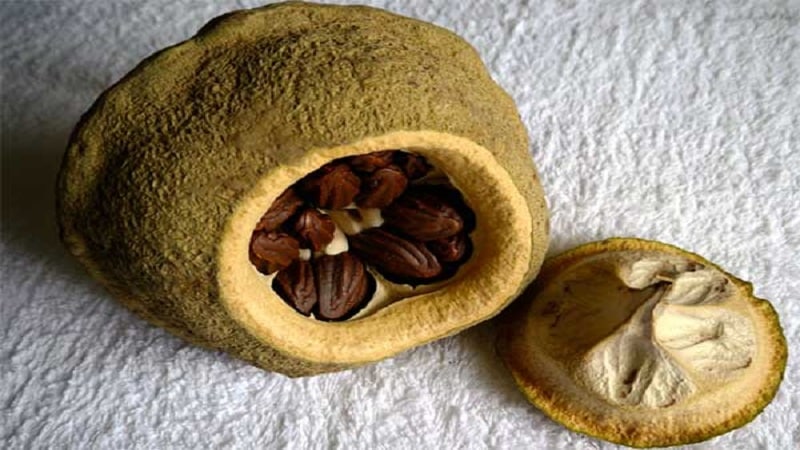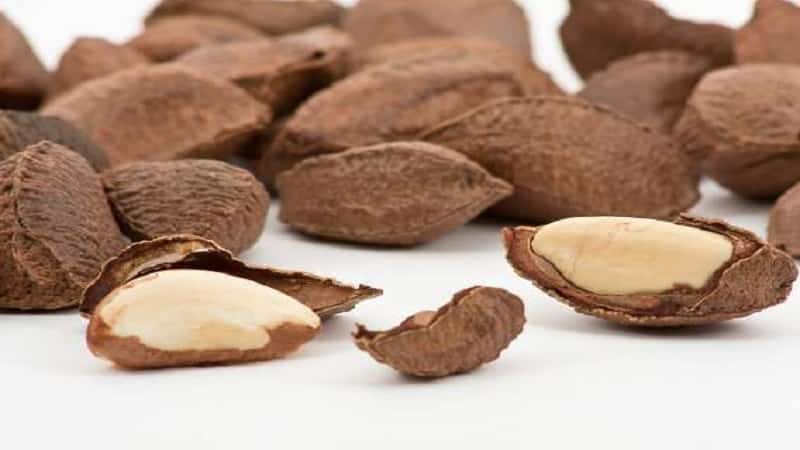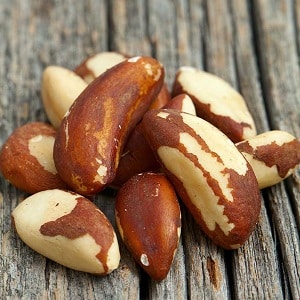Benefits of Brazil nuts for women
Brazil nut, or Pará chestnut, is the grain of the Bertholet tree, native to South America. Their pulp is easily separated from the core, and the shell is divided into halves. The annual production of the fruit reaches 80 thousand tons, and the beneficial properties of the nut are legendary. Meanwhile, the beneficial effects of the product have long been proven by scientists.
From the article you will learn about the chemical composition, energy value, benefits and harms of Brazil nuts for women.
Chemical composition and calorie content
According to biological classification, the Brazil nut is not a nut at all. These are the seeds of Bertholetia, which grows on the South American continent. The plant is native to Venezuela, Guiana, Brazil, eastern Colombia, Bolivia and Peru.
The trees grow in large forests, near the Amazon and Rio Negro rivers. The fruits are collected exclusively from wild trees. The grains are hidden in peculiar boxes with lids.
The structure of the fruit is clearly visible in the photo of a Brazil nut.

The nuts have an earthy flavor and a light floral aroma. The energy value of the product is high, for which it is nicknamed “vegetable meat.”
The table shows the chemical composition of 100 g of product:
| Compound | Content | Norm |
| Vitamin B1 | 0.617 mg | 1.5 mg |
| Vitamin B2 | 0.035 mg | 1.8 mg |
| Vitamin B4 | 28.8 mg | 500 mg |
| Vitamin B5 | 0.184 mg | 5 mg |
| Vitamin B6 | 0.101 mg | 2 mg |
| Vitamin B9 | 22 mcg | 400 mcg |
| Vitamin C | 0.7 mg | 90 mg |
| Vitamin E | 5.65 mg | 15 mg |
| Vitamin PP | 0.295 mg | 20 mg |
| Potassium | 659 mg | 2500 mg |
| Calcium | 160 mg | 1000 mg |
| Magnesium | 376 mg | 400 mg |
| Sodium | 3 mg | 1300 mg |
| Sulfur | 143.2 mg | 1000 mg |
| Phosphorus | 725 mg | 800 mg |
| Iron | 2.43 mg | 18 mg |
| Manganese | 1.223 mg | 2 mg |
| Copper | 1743 mcg | 1000 mcg |
| Selenium | 1917 mcg | 55 mcg |
| Zinc | 4.06 mg | 12 mg |
| Saturated fatty acids | 16.134 g | 18.7 g |
| Polyunsaturated fatty acids | 24.399 g | 11.2–20.6 g |
| Omega-3 | 0.018 g | 0.9–3.7 g |
| Omega-6 | 23.877 g | 4.7–16.8 g |
Nutritional value of 100 g of nuts:
- calorie content - 659 kcal;
- proteins - 14.32 g;
- fats - 67.1 g;
- carbohydrates - 4.24 g;
- fiber - 7.5 g;
- water - 3.42 g;
- ash - 3.43 g.
Just two nuts of 5 g per day cover the daily requirement of selenium. The optimal daily portion is 30 g (or six nuts).
Interesting! The powerful root system of the tree “pulls” selenium from the soil and synthesizes the antioxidant element.
The product contains minerals in organic form, so the body absorbs them 100%.
Useful properties for women
Brazil nuts are recommended for use by women who have problems conceiving and bearing a child. The fruits of the Bertholet tree normalize hormonal levels and prolong childbearing age.
Brazil nuts help:
- maintain youth, attractiveness and quality of skin;
- replenish minerals and vitamins, strengthen hair and nails;
- reduce the level of “bad” cholesterol;
- prevent early cell aging;
- reduce excess weight.
The retail price of 1 kg of nuts ranges from 600 to 900 rubles. depending on the supplier.
General benefit
Brazil nut regulates heart function, reduces the risk of heart attack, stroke and atherosclerosis due to its high content of unsaturated fatty acids. The antioxidant properties of Para chestnut minimize the risk of developing Alzheimer's and Parkinson's diseases, thrombophlebitis and anemia.
The fruits are recommended to be included in the menu of professional athletes and people weakened by illness or hard work.
Vitamins C and E have a beneficial effect on the skin and preserve youth. Selenium maintains elasticity and healthy skin color, stops premature aging processes, which is important for women over 40.
Reference! Selenium enhances the effects of glutathione, a powerful antioxidant. It weakens the effects of free radicals and protects cells from oxidative stress.
Brazil nuts contain 35% of the daily value of zinc. The nutrient actively fights acne and accelerates acne healing. For prevention, lubricate the skin with nut oil or consume 3-4 kernels per day.

High energy value and a large amount of fiber (up to 29% of the daily value) allow you to reduce the amount of food consumed and saturate the body for a long time. High calorie content imposes some restrictions on those trying to lose weight. The main thing in this matter is moderation and compliance with the daily calorie intake. The value of a serving of nuts (30 g) is 197 kcal - it is well suited as a snack.
Coarse dietary fiber improves the functioning of the digestive system, enhances the contractile function of the intestines and helps the body absorb maximum nutrients. Brazil nuts reduce flatulence, prevent the risk of stomach ulcers, constipation, cramps and colon cancer.
Selenium is responsible not only for an attractive appearance, but also for the functioning of the thyroid gland and hormonal levels. The microelement regulates the functioning of the endocrine system, which has a positive effect on metabolism and improves general condition.

Brazil nut is considered a powerful immunostimulant: vitamin C and zinc activate the synthesis of antioxidants and white blood cells.
The fruits of the Bertholet tree are an excellent replacement for animal protein for vegetarians and adherents of strict diets. A deficiency of this “building material” leads to muscle weakness, swelling, deterioration in the quality of hair and skin, decreased immunity, and causes constant hunger and apathy. The recommended protein intake is 1–1.5 g per kg of body weight.
Brazil nuts are useful for people who have suffered severe infectious diseases, operations and bone fractures. In combination with ascorbic acid, the fruits have a positive effect on musculoskeletal tissue, accelerate its regeneration, and strengthen small and large blood vessels.
Reference! Bertoletia lives about 500 years. This is one of the tallest plants on the planet, its diameter reaches 2 m and height 50 m.
During pregnancy and lactation
Pregnancy and breastfeeding do not impose restrictions on the consumption of chestnuts from Pará, but it is important to maintain moderation in quantity. During lactation, the baby’s reaction is monitored, and the product is introduced into the diet gradually, starting with 1 fetus.
If a child experiences an allergic reaction, stop using the product.
Contraindications and possible harm
The benefits and harms of Brazil nuts are interconnected. They have a pleasant taste - sometimes it’s hard to resist not to eat more than normal. A serving of 100 g will replace half of the daily caloric intake, and excessive consumption threatens to gain extra pounds. People with low physical activity are recommended to eat no more than 6 nuts per day. This is enough to provide the body with valuable nutrients.
Doctors advise hypertensive patients to treat nuts with caution: excess fat increases blood pressure and worsens their general condition.
Direct contraindications to the use of the product are individual intolerance and allergies.
100 g of Brazil nut contains 7 daily norms of selenium. Its excess causes general intoxication of the body, a feeling of fullness in the solar plexus area, nausea and heartburn.
This is interesting:
Useful properties of parsley for women.
Melon is the best friend for a woman’s body: what are its benefits.
Conclusion
Hearty, tasty and healthy Brazil nut relieves hunger for a long time, replenishes vitamins and minerals, maintains beauty, youth and preserves women's health.
Just 5-6 nuts a day will normalize hormonal levels, speed up metabolic processes in the body, reduce the risk of cancer and support the functioning of the cardiovascular system.